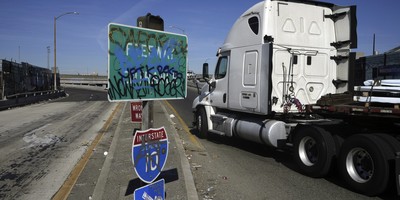"I'm not exaggerating," said President Barack Obama. "Leaders of the Republican Party ... called the passage of (the health care reform bill) 'Armageddon.' Armageddon! 'End of freedom as we know it.' So after I signed the bill, I looked around to see if there were any asteroids falling or some cracks opening up in the earth. Turned out it was a nice day. Birds were chirping. Folks were strolling down the Mall."
Post-ObamaCare the sun indeed rose in the east, Denny's remained open and California stayed attached to the mainland. Therefore, according to Obama, ObamaCare opponents engaged in baseless fear-mongering. This is an interesting definition of success: Government tax-spend-spread-the-wealth works if, come morning, our cars start.

The corrosion caused by the relentless expansion of the Welfare State doesn't work that way. The costs are harder to see, the damage more difficult to discern -- especially given our leftist media/commentary class, which doesn't know Milton Friedman from Milton Berle.
Government, for example, again and again extends unemployment compensation -- oblivious to or unconcerned about its hidden costs. Last December, the then chairman of the House Ways and Means Committee, Charlie Rangel, D-N.Y., chortled on his Web site: "I have great news to share with you. The House passed an extension of unemployment insurance and COBRA health benefits last night. Had we not acted, 1 million workers would have lost these benefits at the end of the year."
Lawrence Summers, former Treasury secretary under Bill Clinton and current Obama economics adviser, wrote in 1999: "(One) way government assistance programs contribute to long-term unemployment is by providing an incentive, and the means, not to work. ... Unemployment insurance and other social assistance programs (cause) an unemployed person to remain unemployed longer." Had "we not acted," how many people would have taken action and found work?
Recommended
Similarly, banks and financial firms engaged in "reckless" behavior in part because they assumed -- correctly so -- that government considered them too important or too big to fail. Encouraged by government policy to increase lending to those unable to meet usual criteria, banks made loans to otherwise non-creditworthy borrowers. And "government-sponsored entities," Fannie Mae and Freddie Mac, bought these loans with an implicit understanding -- true, it turned out -- that the government would not let Freddie and Fannie fail. What stops bailouts from promoting future counterproductive behavior?
ObamaCare guarantees medical insurance to nearly all Americans -- regardless of economic status, willingness to pay or health. But achieving the goal of "universal coverage" -- while supposedly restraining costs -- will require government rationing. A recent front-page New York Times article admits: "From an economic perspective, health reform will fail if we can't sometimes push back against the try-anything instinct. The new agencies will be hounded by accusations of rationing, and Medicare's long-term budget deficit will grow. So figuring out how we can say no may be the single toughest and most important task facing the people who will be in charge of carrying out reform. 'Being able to say no,' Dr. Alan Garber of Stanford says, 'is the heart of the issue.'"
Leftists want to take from the "rich" to "level the playing field" and "close the gap between the rich and the poor." But higher taxes discourage people from taking risks. This in turn creates a disincentive to hire, which means fewer jobs for the non-rich.
The first thing you learn in economics is simple: There ain't no such thing as a free lunch. The second thing you learn is this: A lot of people don't believe the first thing.
Things cost money. Government action to deliver them involves trade-offs. Leftists want bigger social programs and greater government regulation over everything from financial services to manufacturing to student loans. But they refuse to see, admit or care about trade-offs.
An economics professor asked his class which of these two scenarios the students preferred. First scenario: Japan grows at an annual rate of 7 percent, and the Unites States grows at 4 percent. Second scenario: Japan and the United States both grow at 3 percent. Overwhelmingly, the students chose the second option. In other words, the students accepted their own lower domestic growth rather than allow Japan -- a friendly nation -- to outpace us. In exchange for "equality," they chose an otherwise lower standard of living. They, at least, acknowledged the existence -- and accepted the price -- of the trade-off. If people understood the damage done when government takes from A and gives to B, how many would sign on?
So, is it "Armageddon"?
Collectivism is a bargain that most people -- if they knew the real price tag -- would reject. These trade-offs include lower productivity, diminished initiative, fewer jobs, rewarding reckless behavior and poor choices, a lower-than-otherwise standard of living, less economic freedom, greater government dependency, and fewer resources to spend on national security and to secure our borders.
By that definition, then, yes. Armageddon is already here.

























Join the conversation as a VIP Member